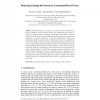30 search results - page 2 / 6 » Serious Games for Language Learning: How Much Game, How Much... |
ICML
2008
IEEE
14 years 5 months ago
2008
IEEE
Quite a bit is known about minimizing different kinds of regret in experts problems, and how these regret types relate to types of equilibria in the multiagent setting of repeated...
WOLLIC
2007
Springer
13 years 11 months ago
2007
Springer
We survey several computational interpretations of classical linear logic based on two-player one-move games. The moves of the games are higherorder functionals in the language of ...
UM
2010
Springer
13 years 10 months ago
2010
Springer
Recently, detectors of gaming the system have been developed for several intelligent tutoring systems where the problem-solving process is reified, and gaming consists of systemati...
CRYPTO
2000
Springer
13 years 9 months ago
2000
Springer
In this work we use cryptography to solve a game-theoretic problem which arises naturally in the area of two party strategic games. The standard game-theoretic solution concept for...
ESWS
2008
Springer
13 years 6 months ago
2008
Springer
Most of the challenges faced when building the Semantic Web require a substantial amount of human labor and intelligence. Despite significant advancement in ontology learning and h...




